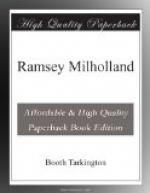Fred Mitchell, ever volatile and generous, was one of those who went quite wild. No orator, he nevertheless made a frantic speech at the week’s “frat meetings,” cursing the Germans in the simple old English words that their performance had demonstrated to be applicable, and going on to demand that the fraternity prepare for its own share in the action of the country. “I don’t care how insignificant we few fellows here to-night may seem,” he cried; “we can do our little, and if everybody in this country’s ready to do their own little, why, that’ll be plenty! Brothers, don’t you realize that all over the United States to-night the people are feeling just the way we are here? Millions and millions and millions of them! Wherever there’s an American he’s with us—and you bet your bottom dollar there are just a few more Americans in this country of ours than there are big-mouthed lobsters like that fellow Linski! I tell you, if Congress only gives the word, there could be an army of five million men in this country to-morrow, and those dirty baby-killin’ dachshunds would hear a word or two from your Uncle Samuel! Brothers, I demand that something be done right here and now, and by us! I move we telegraph the Secretary of War to-night and offer him a regiment from this university to go over and help hang their damn Kaiser.”
The motion was hotly seconded and instantly carried. Then followed a much flustered discussion of the form and phrasing of the proposed telegram, but, after everything seemed to have been settled, someone ascertained by telephone that the telegraph company would not accept messages containing words customarily defined as profane; so the telegram had to be rewritten. This led to further amendment, and it was finally decided to address the senators from that state, instead of the Secretary of War, and thus in a somewhat modified form the message was finally despatched.
Next day, news of what the “frat” had done made a great stir in the university; other “frats” sent telegrams, so did the “Barbarians,” haters of the “frats” but joining them in this; while a small band of “German-American” students found it their duty to go before the faculty and report these “breaches of neutrality.” They protested heavily, demanding the expulsion of the “breachers” as disloyal citizens, therefore unfit students, but suffered a disappointment; for the faculty itself had been sending telegrams of similar spirit, addressing not only the senators and congressmen of the state but the President of the United States. Flabbergasted, the “German-Americans” retired; they were confused and disgusted by this higher-up outbreak of unneutrality—it overwhelmed them that citizens of the United States should not remain neutral in the dispute between the United States and Germany. All day the campus was in ferment.




